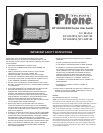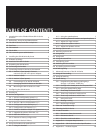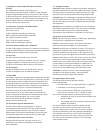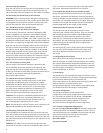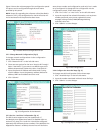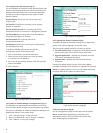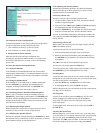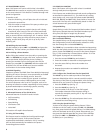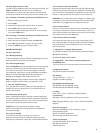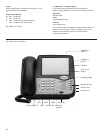1. Introduction to the Teledex iPhone SIP LD Series
IP Phone
The Teledex iPhone SIP LD series IP phone is a
SIP-compliant network terminal. Instead of using standard
analog or digital telephone lines, it connects to the network
in the same manner as computers and printers do. The voice
and control signals to and from the SIP LD series phones are
entirely digital data that is transmitted over the data
network, rather than phone lines.
1.1 Definitions, Acronyms and Abbreviations
PoE: Power over Ethernet
VoIP: Voice over IP
IP-PBX: IP-based Private Branch Exchange
PSTN: Public Switched Telephone Network
SIP: Session Initiation Protocol
TFTP: Trivial File Transfer Protocol
DTMF: Dual Tone Multiple Frequency
1.2 The SIP LD Series Woks Like a Telephone
The SIP LD series phone functions in a manner very similar to
analog or digital telephone instruments that are connected to
a PABX (private automatic branch exchange.)
1.3 Two Lines
The SIP LD series can handle one or two calls
simultaneously, much like a standard “two-line” analog
or digital telephone. However, there is only one line
(or cable) connecting the SIP LD series to the network.
1.4 The Network
Instead of telephone lines, the SIP LD series connects
to other IP telephones via an Ethernet network.
1.5 The IP-PBX
An IP-PBX is a telephone switching system inside that switches
calls between Voice over IP (VoIP) users on local lines, and lets
all users share a certain number of external telephone lines.
The typical IP-PBX can also switch calls between a VoIP user
and a traditional telephone user, or between two traditional
telephone users much like a conventional PBX does.
The IP-PBX controls all of the SIP LD series terminals
on the network, as well as other types of VoIP terminals
that are connected to the network. The SIP LD series works
with various IP-PBX products. For a list of IP-PBX
servers with which the SIP LD series is compliant,
please visit www.teledex.com.
1.6 The Network System Administrator
The SIP LD series requires configuration in order to
work properly on the network. This task is performed by
a technical specialist referred to as a network or system
administrator. The network administrator will perform the
configuration steps from a control station at the IP-PBX.
2. Installing the SIP LD Series IP Phone
Installing the SIP LD series in a guest room or at a
workstation is as simple as installing a conventional
office telephone.
2.1 A Matter of Safety
WARNINGS mean danger to persons and possibly, damage to
equipment. Whenever you see this symbol, be careful to study
the steps that you will perform, and be sure that you under-
stand the nature of the hazards before beginning the task.
CAUTION mean risk of damage to equipment. Whenever you
see this symbol, be aware of the steps that you will perform
and be sure that you avoid the conditions that may damage
the equipment.
NOTES point out exceptions or additions to the information
presented in a particular section. You may want to highlight
some information that you will need to remember
periodically in the operation or installation of this device.
2.2 Versions of the SIP LD Series
NOTE: There are has three versions of this phone, depending
on how power is supplied to the telephone.
Version 1: Local power version. This version requires an
approved inline power adapter to provide power.
Version 2: PoE (Power over Ethernet) version. This version is
designed for customers with a PoE compatible network
interface available (e.g. PoE switch, or PoE injectors). The
power for the phone is supplied over the Ethernet network.
Version 3: Dual-power version. The version can work in either
local power or PoE mode, depending on jumper settings
made to the phone. When the phone is working in the local
power mode, an inline power adapter is needed (as for
Version 1). When the phone is working in PoE mode, the
power will be provided through the PoE Ethernet port.
CAUTION: For Version 3, there is risk of damaging the
equipment if the power jumper is not set properly
according to the specification from Teledex.
2.3 Unpacking the SIP LD series
The SIP LD series IP phone package contains
several components:
• The main base unit, or keyset (see figure 1, page 10)
• A handset for use during conversations
• Two or three network cables for connecting the
phone to the network, or a PC. The SIP LD series
has a built-in Ethernet switch, and two Ethernet ports.
• A handset coil cord, to connect the handset to the
phone, or base.
• The package may also contain an optional power
adapter (if necessary).
For Version2 (PoE version), no power adapter will be
provided. For the Version 1 (local power version) and
Version 3 (dual-power version), an inline power adapter
may be provided along with the package, depending on
the intended country of use. The inline power adapter
provides two network ports. One is used to connect with
the user’s network interface; another is for connecting
with the SIP LD series.
3



